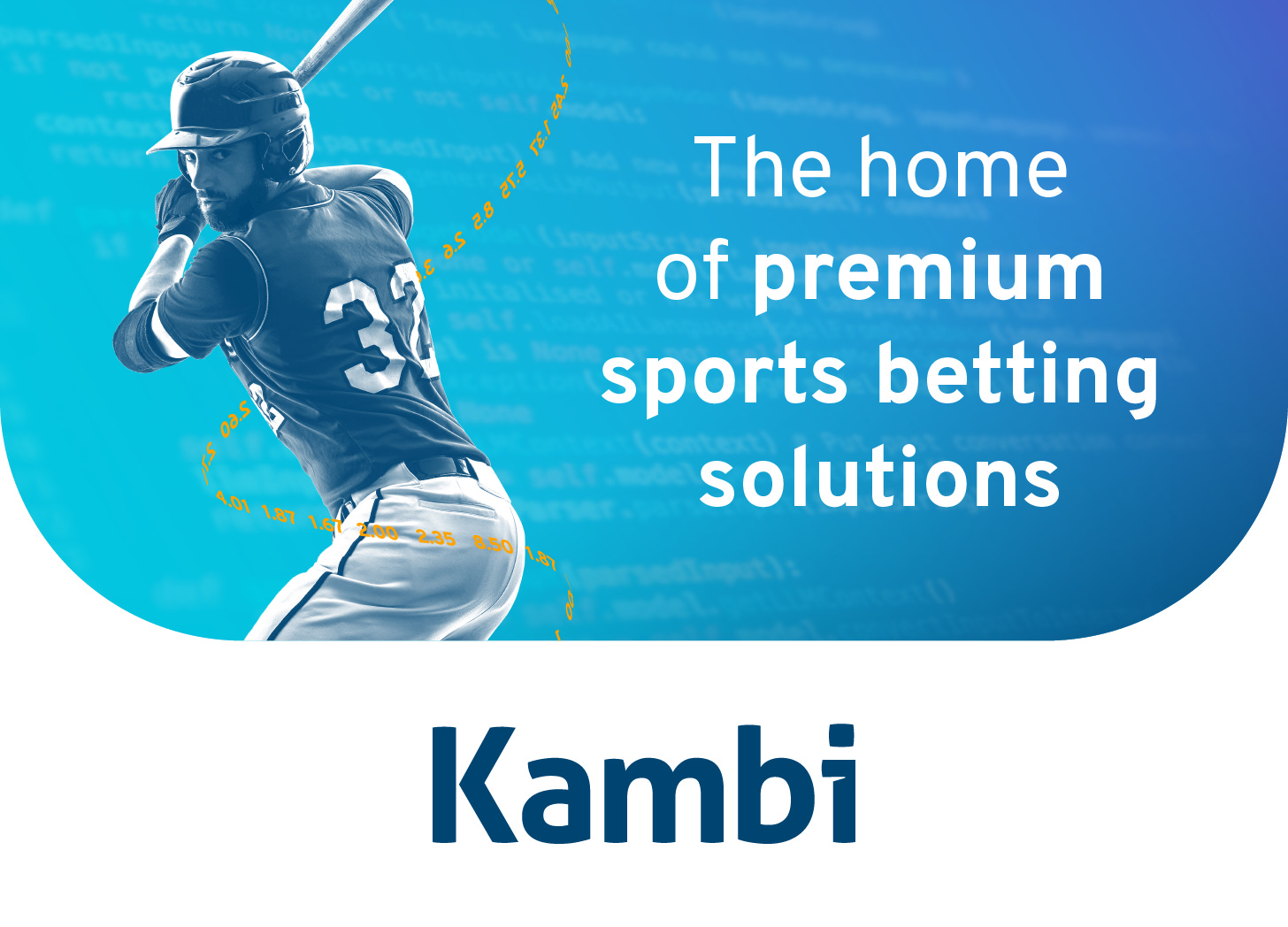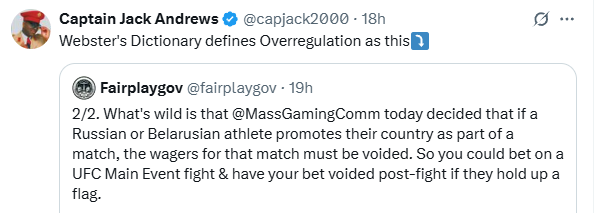Open Sesame
Rhode Island considers ending sports betting monopoly, opening market to multiple operators as revenues decline and competition grows.
The Bulletin Board
THE LEDE: Rhode Island lawmakers want a competitive sports betting market.
ROUNDUP: Hard Rock adds online trivia; A look at who is raising money in the sector; NCAA punishes Iowa St staff for prohibited wagers.
VIEWS: Is the NCAA’s recent data agreement a genius move?
AROUND the WATERCOOLER: The MGC opens a can of worms.
STRAY THOUGHTS: Why competition is good (in one sentence).
Sponsor’s Message: Increase Operator Margins with EDGE Boost Today!
EDGE Boost is the first dedicated bank account for bettors.
Increase Cash Access: On/Offline with $250k/day debit limits
No Integration or Costs: Compatible today with all operators via VISA debit rails
Incremental Non-Gaming Revenue: Up to 1% operator rebate on transactions
Lower Costs: Increase debit throughput to reduce costs against ACH/Wallets
Eliminate Chargebacks and Disputes
Eliminate Debit Declines
Built-in Responsible Gaming tools
To learn more, contact Matthew Cullen, Chief Strategy Officer, Matthew@edgemarkets.io
The Lede: Is Competition Coming to RI Sports Betting
Legislation that would end the lottery-run monopoly on sports betting is under discussion in the Rhode Island House and Senate. Under the bills (S 748 and H 6048), Rhode Island’s current sports betting contract with IGT (Sportsbook RI) would not be renewed, and the sports betting market would be opened to at least five operators.
The bill reads:
“After July 1, 2026, the division shall not renew any existing sports-wagering vendor contracts in effect, and, prior to the expiration of any existing sports-wagering vendor contracts, the division shall issue an open invitation to applicants for sports-wagering vendor contracts and then shall award at least five (5) individual sports-wagering vendor contracts. This subsection shall not be construed to direct the commission to award a sports-wagering vendor contract to an unqualified vendor.”
Rhode Island’s monopoly market is not a world beater; more concerning, if you’re the state, revenues are declining. Rhode Island’s sports betting handle was $483.7 million in 2024, up nearly 5% from 2023 but well below the state’s 2022 peak of $532.6 million.
As InGame reported, “A report from the Auditor General also showed the state’s profit from sportsbooks took a big hit with just $19.2 million in Fiscal Year 2024, which is almost 25% less than the year before.”
The decline is likely due to several factors:
Competition in neighboring states like Massachusetts and Connecticut, which have more robust markets and top-tier sportsbooks like DraftKings and FanDuel.
Sportsbook RI’s offerings are less than stellar; Bill sponsor Sen. Frank Ciccone told the Rhode Island Current he introduced the bill after receiving several complaints about the existing Sportsbook RI app, such as the inability to place more specific bets like coinflips and who scores first.
Rhode Island’s sky-high 51% tax rate on sports betting leaves little room for promotions and marketing.
The bad news is the bills don’t have much momentum and look destined to be held over to the 2026 session. S 748 is under review by the Senate Labor and Gaming Commission, which has over 30 bills in its queue. The companion legislation in the House, HB 6048, was held for further study on May 1.
That said, Rhode Island is known for passing gambling bills late in the session (the legislative session is slated to end on June 30, 2025), having legalized online casinos on June 20, 2023, and sports betting on June 22, 2018.
Roundup: Hard Rock Adds Trivia; Who Is Raising Money in the Sector; NCAA Punishes Iowa St. Staff
Hard Rock adds free-to-play Live Trivia to its NJ online casino [Bonus.com]: Hard Rock will become the first New Jersey casino operator to trial a new live-streaming Trivia game show from Playtech. Per Bonus.com, “Hard Rock Trivia nights will take place every Wednesday, starting May 7, and running for at least a month.”
Underdog leads $100 million first quarter funding [Earnings+More]: Total Q1 investments exceeded $100 million, up 50% from last year, with Underdog (a newsletter sponsor) leading the way with a $70 million raise, part of a $100m round valuing the company at $1.23 billion. Edge Markets (also a newsletter sponsor) followed with a $17.9 million round in seed funding.
Defy the Odds + Edge Markets [Press Release]: Speaking of Edge Markets, Defy the Odds announced a strategic partnership with EDGE Markets, the creator of the EDGE Boost debit card (scroll up to EDGE’s ad to learn more about it). Per the press release, “Together, the two companies aim to enhance financial accessibility and innovation within the gaming space while also promoting more responsible gaming. DTO will provide a host of advisory, consultative, and partnership development services within the gaming sector to EDGE Markets.” Defy the Odds cofounder Sue Schneider was a guest on the Straight to the Point Talking Shop Podcast in October.
Kero Gaming closes $3 million funding round: Kero Gaming, a micro-betting odds feeds supplier, announced the successful close of its $3 million Series A funding round. Per the press release, “The round was led by SIG Sports Investments Corp. (SIG Sports), a member of the Susquehanna International Group of Companies, a previous investor in the company, with participation from other existing investors including Eberg Capital, Sharp Alpha Advisors, Chicago Trading Company, Avenue H Capital, and Yolo Investments.”
NCAA punishes Iowa State staff for placing prohibited wagers [Legal Sports Report]: The NCAA disciplined five Iowa State football staffers for placing over 6,200 bets, totaling more than $100,000, including on their own basketball games, from 2021 to 2023. The staffers aren’t facing criminal charges but received one-year show-cause orders through April 2026. If hired by another collegiate program, they must serve a two-week suspension and attend an NCAA rules seminar.
SPONSOR’S MESSAGE - Underdog: the most innovative company in sports gaming.
At Underdog we use our own tech stack to create the industry’s most popular games, designing products specifically for the American sports fan.
Join us as we build the future of sports gaming.
Visit: https://underdogfantasy.com/careers
Views: ESPN’s Dan Wetzel on the NCAA-Genius Deal
I came across this excellent piece from ESPN’s Dan Wetzel on the NCAA-Genius Sports deal, which Wetzel believes is an attempt to improve integrity in a near impossible to police climate:
“Criticize the NCAA members for any number of issues. But there should be no doubt that they want to prevent their games from being compromised, their players from being corrupted, and their athletes from being harassed and threatened by unsuccessful gamblers.
“[…]
“The most recent men's basketball season, for example, included a handful of suspicious suspensions. These did not involve March Madness or SEC football, but obscure bets (say, first-half totals) on losing, low-major hoops teams.
“How do you try to stop that?
“Well, last week the NCAA got creative with a move that might appear to be naked hypocrisy but is actually a bit of savvy from an organization rarely known for it.”
Wetzel highlighted the “Do-as-I-say, not-what-I-profit-from” optics of the agreement, but notes that the headlines from the arrangement aren’t the entire story.
As I noted in my thoughts on the NCAA’s deal with Genius Sports:
“… as others have pointed out, the NCAA appears to be sitting on both sides of the sports betting fence, as it has been arguing for prohibitions on prop bets on individual college athletes.
“Or are they? There is an important caveat in the new deal. “Genius Sports will also collaborate with participating licensees to strengthen integrity protections and promote responsible betting practices, including limiting risky bet types, ensuring compliance and safeguarding student-athletes,” the press release reads.”
Wetzel zeroed in on this same caveat, writing that using the data (seen as a valuable asset) will require sportsbooks to stop offering potentially problematic (difficult and expensive to police) bets.
It would appear that licensed sportsbooks have a decision to make. Offer numerous markets or use official NCAA data provided by Genius Sports.
Another point of an agreement with Wetzel was this line: “In the grand scheme of things, this may be just a sandcastle against a rising tide, but it is still something. This should produce a tangible, even if slight-to-moderate, impact.”
Of course, others see it differently.
The Public Health Advocacy Institute (PHAI) has issued a statement in response to the NCAA's new decision to sell real-time player data to the gambling industry through its new deal with Genius Sports, with PHAI's President, Richard Daynard; Executive Director, Mark Gottlieb; and Director of Gambling Policy, Dr. Harry Levant, warn that by promoting AI-driven micro-betting – one of the most dangerous and addictive forms of gambling – the NCAA is putting profits over public health and exposing student-athletes, their families, and the public to serious harm.
Levant warns that the NCAA is recklessly claiming that the sale of data will reduce the risks associated with prop betting:
“The NCAA has increased the risk of harm. People will now wager on virtually everything that college players do in each game. To justify this, the NCAA claims the money from selling data will fund education programs. This is the equivalent of the tobacco industry offering the non-stop sale of cigarettes and then using the revenue to fund education programs. The justification offered by the NCAA is disingenuous at best.”
SPONSOR’S MESSAGE - Kambi is the industry’s leading independent provider of premium sports betting technology and services. Trusted by dozens of operators worldwide, each benefitting from the power of Kambi’s global network, Kambi has a proven track record of giving partners the decisive competitive edge required to grow and outperform the market.
As the home of premium sports betting solutions, Kambi offers an expansive product portfolio that caters to the evolving needs of operators and players alike. At its core is Kambi's flagship Turnkey Sportsbook, renowned for its scalability, flexibility, and unrivaled track record of delivering world-class betting experiences globally. Complementing this are Kambi’s cutting-edge standalone products: Odds Feed+, Managed Trading, Sportsbook Platform, Bet Builder, Esports, and Front End.
Around the Watercooler
Social media conversations, rumors, and gossip.
This one pretty much speaks for itself.
The final line in the lead paragraph of InGame’s Jill Dorson’s coverage pretty much sums up the state of things [bold mine]:
“In early 2023, Massachusetts gaming commissioners put a regulation on the books that bans betting on players or teams who promote or represent Russia or Belarus. The war in Ukraine started the previous year, and the Massachusetts Gaming Commission (MGC) was at the forefront of making a political statement through betting policies.”
I love the MGC for their willingness to hold operators to the highest of standards, but how this policy is considered effective gambling regulation is beyond me. There are some potentially horrific downstream consequences.
Once again, we are burdening licensed operators with needless regulations.
As I said last week, “A willingness to be licensed should be a competitive advantage,” yet, somehow, they have become an albatross.
“States never make it easier on their licensed operators. Tax rate increases (or the threat of) are always on the table. New regulatory burdens get implemented. Compliance departments are summoned before gaming commissions for hours on end to explain a minor misstep or discuss the (sometimes necessary and sometimes not) issue du jour.
“The world thinks a gambling license is a license to print money; the truth is, it’s a hard way to make an easy living.”
Is it any wonder companies are trying to find new entry points? ‘Give us millions of dollars (up front and in perpetuity) and we guarantee to make your life a living hell,’ isn’t much of a sales pitch.
Stray Thoughts
Apropos of today’s lead story: "Competition is not only the basis of protection to the consumer, but is the incentive to progress." – Herbert Hoover











My cell wouldn't open the boxes in your post. I just saw the text - now I understand you point. My bad.